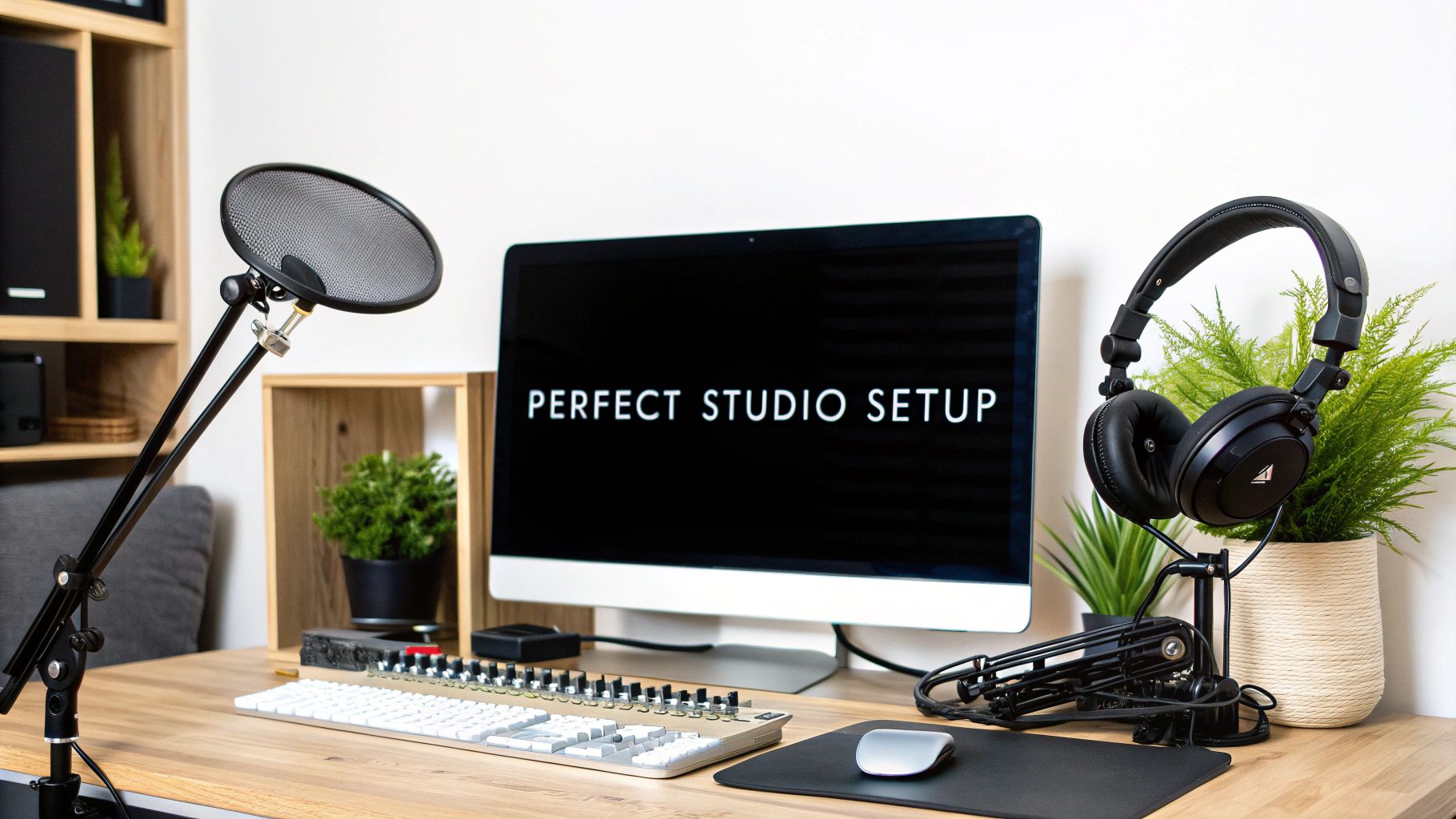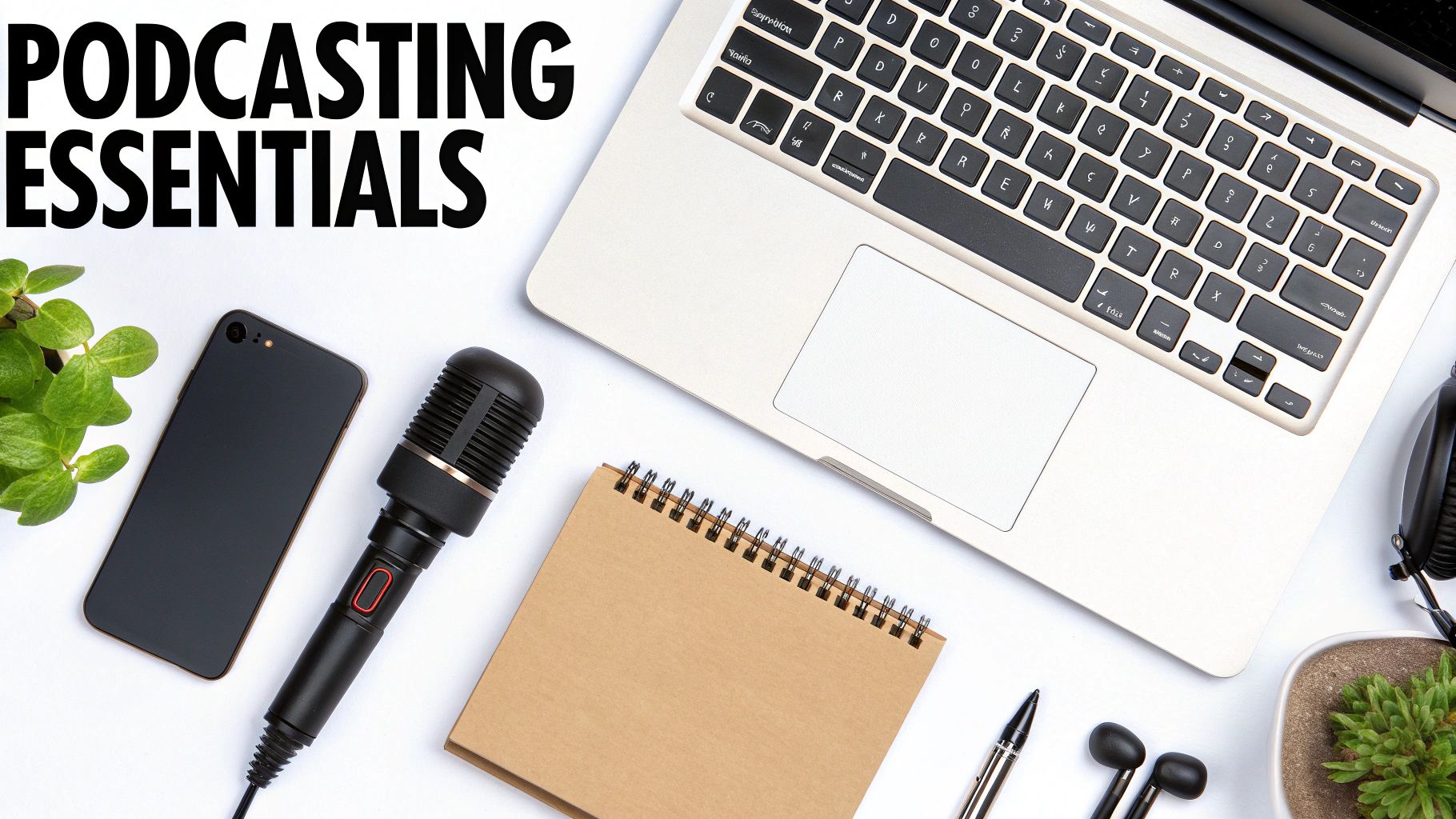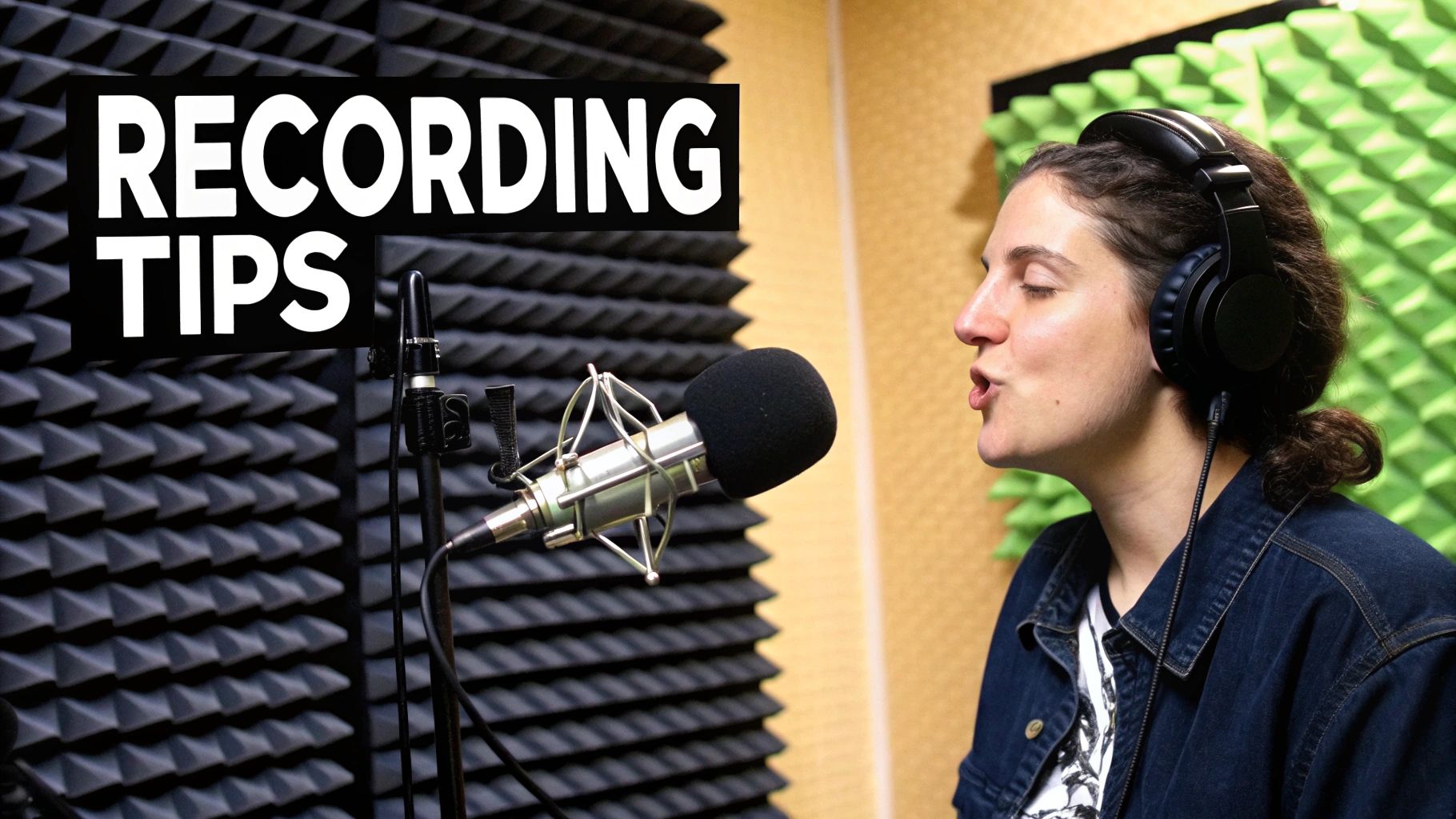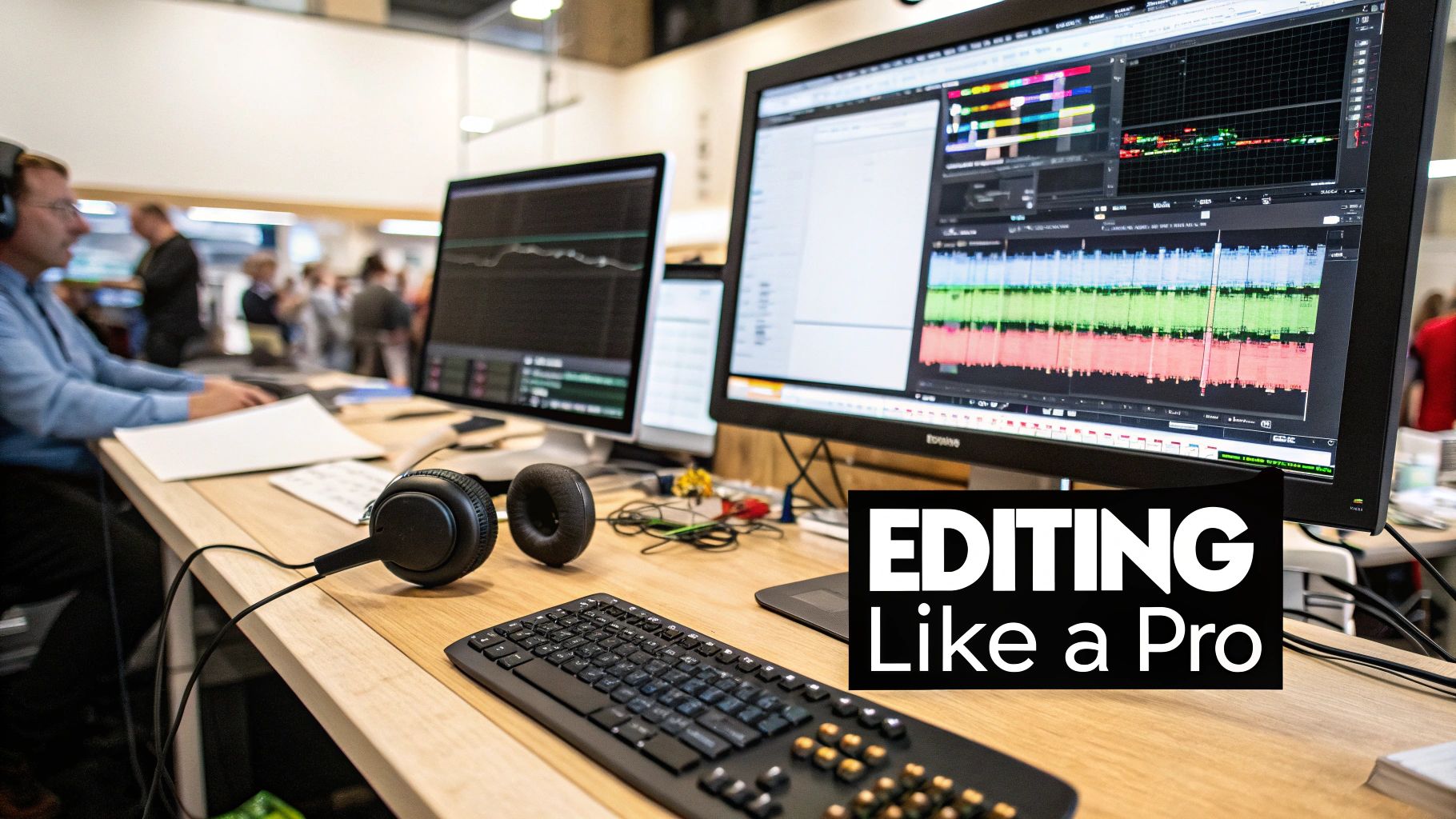
Why Start a Podcast? Understanding the Growing Opportunity

Podcasting gives you a unique way to build genuine connections with your audience. When listeners tune in, they feel like they’re part of an intimate conversation rather than just consuming content. This creates a strong sense of community as people engage deeply with your voice, personality and message. The result? A loyal following that’s truly invested in what you have to share.
The Expanding Landscape of Audio Content
More people are choosing on-demand audio over traditional radio, opening up exciting possibilities for new podcast creators. This shift means there’s room for focused, specialized content that serves specific listener interests. For example, a podcast about vintage synthesizers can build a passionate following among music gear enthusiasts, even without broad mainstream appeal. The key is finding your niche and serving it well.
The numbers back up podcasting’s growth. 67% of Americans have listened to at least one podcast in 2024, up significantly from 55% in 2020. In fact, on-demand audio now gets more listening time than traditional radio in the US. Check out more stats here: Podcast Industry Stats. This means there’s a large and growing audience eager to discover fresh voices and perspectives. You might want to read: How to master your niche.
Finding Your Niche and Building a Community
The reasons to start a podcast are as diverse as the people creating them. Maybe you want to share your expertise, tell compelling stories, or explore topics you’re passionate about. Whatever drives you, podcasting lets you connect authentically with people who share your interests while building a real community. It’s not just about broadcasting – it’s about starting conversations and bringing people together around shared values.
Starting a podcast helps develop valuable skills like public speaking, storytelling, and audio production. These abilities translate well to many professional settings, potentially opening new career opportunities. Whether you aim to grow your brand, share knowledge, or simply connect with others who care about what you do, podcasting provides a direct path to reaching those goals. Success comes from understanding what makes this medium special and finding your authentic voice within it.
Building Your Essential Podcasting Setup
Getting started with podcasting requires more than just an idea – you need reliable equipment to create professional-quality audio that will keep listeners engaged. Just like building a house needs a strong foundation, your podcast needs core tools to succeed – a solid microphone, quality headphones, good software, and a proper recording space.
Choosing the Right Microphone
The microphone serves as your voice to listeners, making it one of your most important investments. For those just starting out, USB microphones are an excellent choice since they plug directly into your computer without needing extra equipment. The ATR2100x-USB stands out as a popular option that delivers clear audio at an accessible price point.
If you’re looking for even better sound quality, XLR microphones paired with an audio interface give you more control and room to grow. Many podcasters choose the Rode PodMic connected to a Focusrite Scarlett Solo interface when they’re ready to take their audio to the next level.
Selecting Essential Headphones
Good headphones are vital for monitoring your recording and catching any audio issues in real-time. Closed-back headphones are best since they prevent sound from bleeding into your microphone during recording. The Audio-Technica ATH-M20x provides great value for beginners, while the Beyerdynamic DT 770 PRO offers improved comfort and audio quality for those wanting to invest more. The right headphones help ensure your audience gets clean, professional-sounding episodes.
Recording Software Options
To capture and edit your podcast, you’ll need reliable recording and editing software. Several great choices exist for different experience levels and budgets. Audacity is an excellent free option that gives you all the basic tools needed to start podcasting. As you develop your skills, paid options like Adobe Audition or Descript provide additional features for more polished production.
| Feature | Audacity (Free) | Adobe Audition (Paid) | Descript (Paid) |
|---|---|---|---|
| Ease of Use | High | Medium | High |
| Editing Features | Basic | Advanced | Advanced |
| Cost | Free | Subscription | Subscription |
Creating an Optimal Recording Environment
Your recording space plays a big role in audio quality. While a professional studio would be nice, you can create great sound in any quiet room. Start by picking a space away from noise – close windows and turn off fans or AC units when recording. Adding soft items like blankets and rugs helps absorb echoes for cleaner sound. Small changes to your recording environment can make a big difference in how professional your podcast sounds to listeners.
Crafting Your Content Strategy for Long-Term Success

Great podcasts need more than just good equipment – they require compelling content that makes listeners eager for the next episode. Creating a content strategy helps you map out engaging topics and formats that align with your goals and connect with your audience. When you take time to plan your content thoughtfully, you’re much more likely to build a show that gains momentum rather than fizzles out.
Defining Your Podcast’s Unique Voice and Target Audience
Finding your authentic voice helps you stand out in the crowded podcast space. Rather than forcing a persona, focus on what makes you naturally engaging – whether that’s your wit, analytical mindset, or empathy. Let your real personality shine through, since listeners can tell when someone is being genuine. Understanding your target audience’s interests and challenges is equally important, as it helps you create content they’ll find valuable and relatable.
Content Planning: From Topics to Series
Good planning keeps your podcast focused and engaging. Start by writing down topic ideas within your niche, considering what fresh perspectives you can offer. For content inspiration, check out our sitemap. Group related topics into episode series that dive deep into specific themes. For example, if you host a show about entrepreneurship, you might create series about starting up on a budget, effective marketing approaches, and balancing work with life.
Structuring Your Episodes for Maximum Engagement
While great content matters most, how you organize each episode plays a big role in keeping listeners hooked. Think of episode structure like storytelling – you need a strong opening hook, smooth transitions between segments, and a clear call-to-action at the end.
The podcast industry continues growing steadily. In 2021, the global market reached USD 13.70 billion and is growing at 31.5% annually. With over 1 million podcasts and 30 million episodes available by late 2020 (learn more about podcast market growth), there’s still plenty of room for new shows with focused content strategies. Setting up a regular content calendar helps you stay on track and build anticipation with your audience. When listeners know they can count on quality content from you consistently, they’re more likely to become loyal fans.
Mastering the Art of Recording and Editing
Making a great podcast takes skill and attention to detail. While anyone can record audio, creating polished, engaging episodes requires mastering both recording and editing techniques. Let’s explore how to produce professional-quality audio that will keep listeners coming back.
Achieving Crystal-Clear Audio
High-quality audio starts with a good recording environment. The good news is you don’t need an expensive studio setup. Find a quiet room away from noise like fans, traffic, and echoes. Add soft materials like blankets, rugs, or foam panels to absorb sound reflections. Just like a singer needs the right acoustics, your voice needs the proper space to shine.
Microphone Techniques and Interview Management
With your recording space ready, focus on microphone skills. Keep a steady distance from the mic to maintain consistent volume levels. For interviews, help guests understand basic mic technique too. Have everyone wear headphones to monitor audio in real-time and catch unwanted noises before they ruin a take. Planning engaging questions and smoothly guiding conversations helps create natural, flowing episodes that listeners will enjoy.
Editing: Transforming Good Content Into Great Episodes
Editing is where raw recordings become polished episodes. This crucial step shapes your content into its best form. Here’s what to focus on:
- Clean up background noise: Remove distracting sounds for crystal-clear audio
- Balance audio levels: Keep volume consistent throughout
- Add music and effects: Enhance your show’s personality (if it fits your style)
- Master the final mix: Optimize sound for various listening platforms
Software and Workflow Tips for Efficiency
Pick editing software that matches your needs and skills. Popular choices include Audacity (free), Adobe Audition, and Descript. Test different options to find what works best for you.
Create a repeatable editing process to save time and maintain quality. Make templates for intros, outros, and transitions that you use often. Think of it like a chef’s mise en place – having everything prepared and organized leads to better results. When you develop and stick to consistent workflows, your episodes will sound more professional and your production time will decrease.
Building Your Audience Through Strategic Distribution

Making a great podcast is just the beginning – getting it in front of the right listeners is equally important. Podcast distribution means strategically sharing your show across platforms where your target audience spends time. With a thoughtful approach to distribution, you can build a dedicated following and achieve your goals, from sharing your expertise to growing a community.
Getting Found on Major Podcast Platforms
The big podcast platforms like Apple Podcasts, Spotify, and Google Podcasts are where most people discover new shows. While having your podcast listed is essential, you need to help listeners find it. This means writing clear, compelling descriptions that include relevant search terms your audience uses. For instance, a show about plant-based cooking should naturally incorporate phrases like “vegan recipes” and “cooking tips” that potential listeners search for.
Growing Through Social Media
Social media offers direct ways to connect with potential listeners. Creating dedicated accounts for your show helps you build an engaged community. Share short clips from episodes, post behind-the-scenes content, and have real conversations with followers. You can also run targeted ads to reach new listeners. The key is moving beyond just promoting episodes to truly engaging with your audience through two-way dialogue.
Creating Episodes Worth Sharing
Personal recommendations from satisfied listeners can grow your audience faster than any marketing campaign. When you create content that genuinely helps or entertains your target listeners, they naturally want to share it. Focus on what makes your show special – maybe it’s your unique perspective, interview style, or production quality. The potential reach is significant: 500 million people listened to podcasts in 2023, with that number expected to hit 650 million by 2027 according to Global Podcast Listener Statistics.
Making Data-Driven Decisions
As your show grows, using analytics helps you understand what’s working. Most podcast hosts provide data on listener demographics, popular episodes, and listening patterns. This information helps you create content your audience loves. Track downloads and engagement across platforms to see where promotion efforts pay off. Focus your time and energy on the distribution channels bringing in engaged listeners who keep coming back for more.
Turning Your Podcast Into a Revenue Generator

Many podcasters worry that monetization will compromise their show’s authenticity. The good news is that there are several proven ways to generate income while staying true to your podcast’s mission and values. Let’s explore practical approaches to turning your podcast into a sustainable business.
Identifying the Right Time to Monetize
The timing of monetization can make or break your success. Rushing to add sponsors too early often pushes away new listeners. Instead, focus first on building a solid foundation – look for stable download numbers and active listener engagement. When your audience regularly interacts through comments and social media, that’s a strong signal they’re ready for thoughtful monetization.
Exploring Revenue Streams
The podcast industry offers several tested revenue models. Here are the most effective options:
- Sponsorships: Partner with relevant brands to include their ads or sponsored segments in your episodes. This works best when sponsors align naturally with your content.
- Affiliate Marketing: Share products you personally use and trust, earning commissions on sales through your unique links. This lets you help listeners while earning income.
- Premium Content: Create special content like bonus episodes or extended interviews for paying subscribers. This rewards your most dedicated fans.
- Donations and Crowdfunding: Use platforms like Patreon to let listeners directly support your show. This is especially powerful for niche podcasts.
- Merchandise: Sell branded items to super-fans once you’ve built strong recognition. T-shirts and mugs help spread awareness while generating revenue.
Learn more in our article about Building and Growing Your Business.
Building Valuable Partnerships
Strong sponsorships depend on finding the right match. Look for brands that share your values and make sense for your listeners. For example, a fitness podcast would naturally partner with healthy food or supplement companies. Focus on sponsors whose products you’d genuinely recommend – your audience can tell when endorsements aren’t authentic.
Tracking Performance and Delivering Value
Successful monetization requires clear metrics. Track essential data like:
- Download numbers
- Website traffic from podcast mentions
- Affiliate link clicks and sales
- Sponsor coupon code usage
Share these results openly with sponsors and supporters. Clear data builds trust and helps justify ongoing partnerships.
Real-World Examples and Case Studies
Look at how other successful shows handle monetization in your niche. Some thrive on major brand sponsorships, while others build sustainable income through listener support. Study their approaches and adapt what works for your unique situation and audience.


Leave a Reply